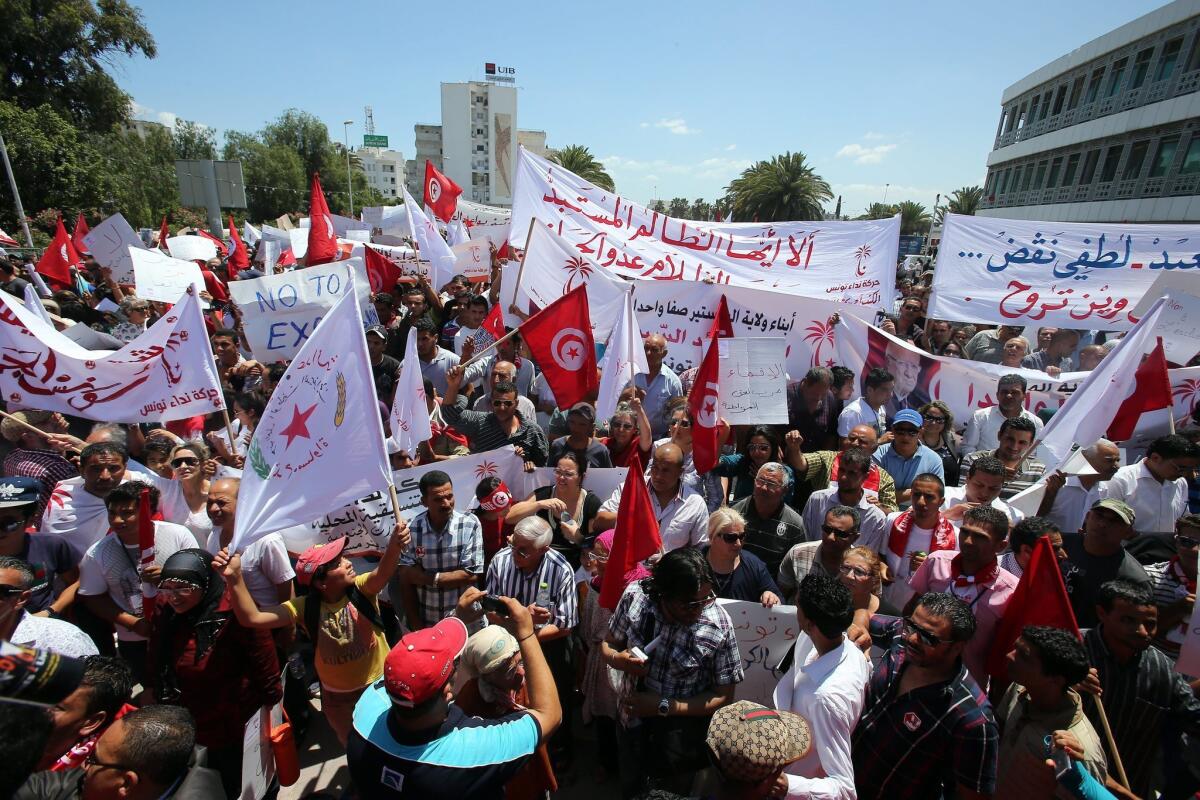Tunisia’s dark turn

While Egypt’s revolution devolves into chaos, Tunisia’s democratic transition, which until now has been the most promising of any in the Arab world, is also in jeopardy. A bill being pushed by Islamists and their allies in National Constituent Assembly called the “law for the protection of the revolution” seems in reality designed to protect the ruling Islamist party, Nahda, from having to face real competition in the next elections.
Like its sister party, the Muslim Brotherhood in Egypt, Nahda triumphed in Tunisia’s first free election, in 2011. In addition to having been the best known and most cohesive opposition force under then-dictator Zine el Abidine ben Ali, Nahda benefited from the exuberance of liberal-minded Tunisians who exercised their newly won freedom by forming dozens of parties, splintering the secular vote.
Nonetheless, Nahda garnered only a plurality, forcing it to govern in coalition with non-Islamists. This constrained it to relative moderation and spared it from some of the mistakes that have now backfired on Egypt’s Islamists.
Still, Tunisia’s voters have found cause for disappointment. A constitution and new elections were promised within a year, but nearly two years have passed and these are still pending. Violence by Islamist militants has torn the country’s social fabric and retarded its economic recovery by deterring the return of tourists and investors, both scared off initially by the revolution.
Now, having learned a bitter lesson in 2011, secular forces have coalesced into a new party that threatens Nahda’s dominance. Nidaa Tounes, or Call of Tunisia, is led by Beji Caid Essebsi, a senior politician who served as transitional prime minister following Ben Ali’s ouster. Most polls show Nidaa Tounes pulling ahead of Nahda in legislative elections and Essebsi leading for president in polling for elections that most expect to be set for early 2014.
Nidaa Tounes merges several liberal and moderate-left parties with a big chunk of Tunisia’s powerful labor movement and some businessmen. It also includes former members of Ben Ali’s party, the Constitutional Democratic Rally, and of the Neo Destour party of Ben Ali’s predecessor, Habib Bourguiba, who led Tunisia to independence and, unlike Ben Ali, remains well remembered even though he too ruled autocratically.
Suddenly, the “law for the protection of the revolution” has been pushed to the top of the legislative calendar. The law would bar a wide range of people deemed to be tainted by association with the old regime from seeking elected office. Several Nahda legislators with whom I met in June told me that “only 3,000 to 4,000” people would fall under the ban. Mohsen Marzouk, a leader of Nidaa Tounes, told me that the number could be as high as 70,000. In any event, it would disqualify several leaders of Nidaa Tounes, including Essebsi. His offense? Having been a member of the Chamber of Deputies 20 years ago.
When I challenged the Nahda leaders about denying the voters a free choice by blacklisting would-be candidates, they responded by likening their bill to de-Nazification following World War II, saying that Nahda had been the victim of a “holocaust” under Ben Ali. This grotesque analogy only underscores the weakness of their argument.
It would be one thing to penalize people found guilty of specific abuses. Indeed, this was the purpose of a law on “transitional justice” proposed more than a year ago. But that bill still languishes, and Nahda leaders told me that the legal procedures it proposes would take too long. Instead, the bill to protect the revolution, which has just passed one reading, punishes whole categories of people merely for political association or speech. For example, among those it would bar from office is anyone who called for Ben Ali to run for president again in 2014.
Of course, if the real purpose were to protect the revolution, this bill would not cover the likes of Essebsi, who many believe is its chief target. While serving as interim prime minister for nearly a year after Ben Ali’s flight, Essebsi oversaw the organization of remarkably clean elections, then handed power peacefully to the victor, Nahda. In short, he did as much as anyone to ensure the success of the revolution.
As another legislator, Noomane Fehri, who belongs to Al Joumhuri, a progressive party that is both a rival and potential partner to Nidaa Tounes, told me, “This thing is simply a political maneuver.” Fehri believes that the bill, which shows that Nahda’s commitment to democracy lasts only as long as it is winning, will boomerang if it passes. But whether it will hurt Nahda or Nidaa Tounes more, the biggest loser will be Tunisia’s chances to become a sturdy democracy.
Joshua Muravchik, a fellow at the Johns Hopkins University School of Advanced International Studies and at the George W. Bush Institute, is the author of “Trailblazers of the Arab Spring: Voices of Democracy in the Middle East.”
More to Read
A cure for the common opinion
Get thought-provoking perspectives with our weekly newsletter.
You may occasionally receive promotional content from the Los Angeles Times.










